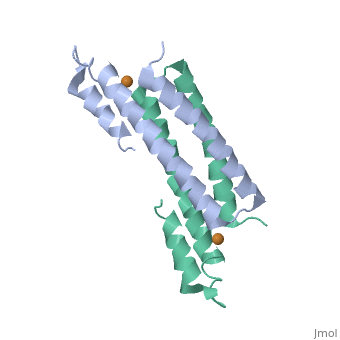2hh7: Difference between revisions
No edit summary |
No edit summary |
||
| Line 3: | Line 3: | ||
== Structural highlights == | == Structural highlights == | ||
<table><tr><td colspan='2'>[[2hh7]] is a 1 chain structure with sequence from [http://en.wikipedia.org/wiki/Mycobacterium_tuberculosis Mycobacterium tuberculosis]. Full crystallographic information is available from [http://oca.weizmann.ac.il/oca-bin/ocashort?id=2HH7 OCA]. For a <b>guided tour on the structure components</b> use [http://oca.weizmann.ac.il/oca-docs/fgij/fg.htm?mol=2HH7 FirstGlance]. <br> | <table><tr><td colspan='2'>[[2hh7]] is a 1 chain structure with sequence from [http://en.wikipedia.org/wiki/Mycobacterium_tuberculosis Mycobacterium tuberculosis]. Full crystallographic information is available from [http://oca.weizmann.ac.il/oca-bin/ocashort?id=2HH7 OCA]. For a <b>guided tour on the structure components</b> use [http://oca.weizmann.ac.il/oca-docs/fgij/fg.htm?mol=2HH7 FirstGlance]. <br> | ||
</td></tr><tr><td class="sblockLbl"><b>[[Ligand|Ligands:]]</b></td><td class="sblockDat"><scene name='pdbligand=CU1:COPPER+(I)+ION'>CU1</scene>< | </td></tr><tr id='ligand'><td class="sblockLbl"><b>[[Ligand|Ligands:]]</b></td><td class="sblockDat"><scene name='pdbligand=CU1:COPPER+(I)+ION'>CU1</scene></td></tr> | ||
<tr><td class="sblockLbl"><b>Resources:</b></td><td class="sblockDat"><span class='plainlinks'>[http://oca.weizmann.ac.il/oca-docs/fgij/fg.htm?mol=2hh7 FirstGlance], [http://oca.weizmann.ac.il/oca-bin/ocaids?id=2hh7 OCA], [http://www.rcsb.org/pdb/explore.do?structureId=2hh7 RCSB], [http://www.ebi.ac.uk/pdbsum/2hh7 PDBsum]</span></td></tr> | <tr id='resources'><td class="sblockLbl"><b>Resources:</b></td><td class="sblockDat"><span class='plainlinks'>[http://oca.weizmann.ac.il/oca-docs/fgij/fg.htm?mol=2hh7 FirstGlance], [http://oca.weizmann.ac.il/oca-bin/ocaids?id=2hh7 OCA], [http://www.rcsb.org/pdb/explore.do?structureId=2hh7 RCSB], [http://www.ebi.ac.uk/pdbsum/2hh7 PDBsum]</span></td></tr> | ||
<table> | </table> | ||
== Evolutionary Conservation == | == Evolutionary Conservation == | ||
[[Image:Consurf_key_small.gif|200px|right]] | [[Image:Consurf_key_small.gif|200px|right]] | ||
| Line 34: | Line 34: | ||
</StructureSection> | </StructureSection> | ||
[[Category: Mycobacterium tuberculosis]] | [[Category: Mycobacterium tuberculosis]] | ||
[[Category: Ramesh, A | [[Category: Ramesh, A]] | ||
[[Category: Sacchettini,J C | [[Category: Sacchettini,J C]] | ||
[[Category: 4-helix bundle]] | [[Category: 4-helix bundle]] | ||
[[Category: Unknown function]] | [[Category: Unknown function]] | ||
Revision as of 16:39, 25 December 2014
Crystal Structure of Cu(I) bound CsoR from Mycobacterium tuberculosis.Crystal Structure of Cu(I) bound CsoR from Mycobacterium tuberculosis.
Structural highlights
Evolutionary Conservation Check, as determined by ConSurfDB. You may read the explanation of the method and the full data available from ConSurf. Publication Abstract from PubMedCopper is an essential element that becomes highly cytotoxic when concentrations exceed the capacity of cells to sequester the ion. Here, we identify a new copper-specific repressor (CsoR) of a copper-sensitive operon (cso) in Mycobacterium tuberculosis (Mtb) that is representative of a large, previously uncharacterized family of proteins (DUF156). Electronic and X-ray absorption spectroscopies reveal that CsoR binds a single-monomer mole equivalent of Cu(I) to form a trigonally coordinated (S(2)N) Cu(I) complex. The 2.6-A crystal structure of copper-loaded CsoR shows a homodimeric antiparallel four-helix bundle architecture that represents a novel DNA-binding fold. The Cu(I) is coordinated by Cys36, Cys65' and His61' in a subunit bridging site. Cu(I) binding negatively regulates the binding of CsoR to a DNA fragment encompassing the operator-promoter region of the Mtb cso operon; this results in derepression of the operon in Mtb and the heterologous host Mycobacterium smegmatis. Substitution of Cys36 or His61 with alanine abolishes Cu(I)- and CsoR-dependent regulation in vivo and in vitro. Potential roles of CsoR in Mtb pathogenesis are discussed. CsoR is a novel Mycobacterium tuberculosis copper-sensing transcriptional regulator.,Liu T, Ramesh A, Ma Z, Ward SK, Zhang L, George GN, Talaat AM, Sacchettini JC, Giedroc DP Nat Chem Biol. 2007 Jan;3(1):60-8. Epub 2006 Dec 3. PMID:17143269[1] From MEDLINE®/PubMed®, a database of the U.S. National Library of Medicine. See Also
References
|
| ||||||||||||||||
